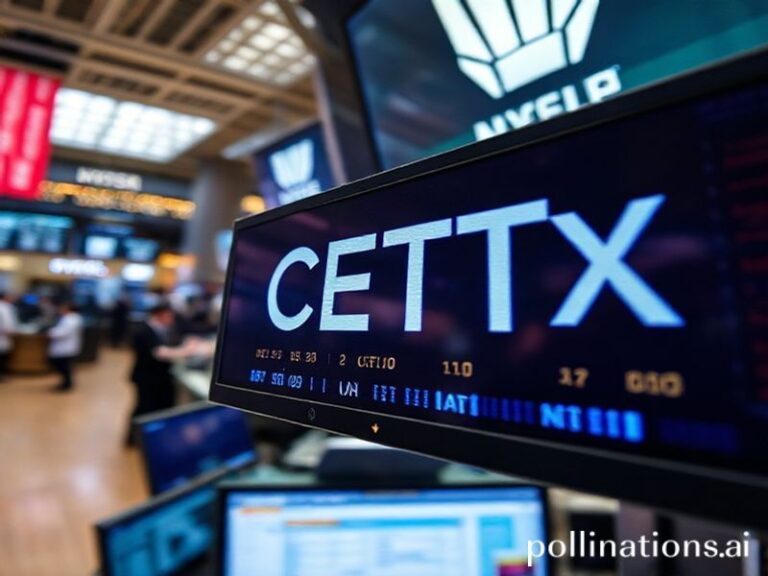Bases Loaded, World on Fire: The MLB Playoffs as Global Absurdist Theater
The planet is burning, currencies are wobbling like a drunk on a Segway, and yet somewhere in North America grown men in pajamas are sprinting in precise geometric patterns while millions watch with the solemnity of papal conclave. Welcome to the 2024 MLB Postseason, that annual festival where statistical theology meets corporate pantomime and the rest of the world pretends to remember what an RBI is.
For the uninitiated (approximately 7.9 billion of you), the playoffs are baseball’s answer to gladiatorial combat, only with more chewing gum and fewer lions. Ten franchises—down from thirty, because apparently scarcity equals drama—vie for a trophy shaped like a euphemism. The process takes a month and roughly 1,500 metric tonnes of sunflower seeds, which, if piled up, could probably dam the Yangtze. But the event’s true product isn’t sport; it’s a transnational spectacle of late-capitalist anxiety wrapped in nostalgic Americana, exported like bourbon and drone policy.
Consider viewership patterns. While U.S. ratings sag like a retiree’s jowls, international streaming has quietly surged. Tokyo salarymen stream games on bullet trains; Dublin pubs open at 3 a.m. for “research purposes”; and in Lagos, a thriving cottage industry of WhatsApp groups translates obscure baseball slang into Yoruba proverbs. (“He struck out” becomes “The goat forgot the path to the barn.”) MLB International, smelling lucre like a truffle pig, now beams games in seventeen languages, including Korean, Portuguese, and something they label “Global English,” which mostly means replacing “bullpen” with “relief-pitcher waiting room” so Europeans don’t imagine livestock.
The geopolitical subtext is thicker than pine tar. Last year the Houston Astros—owned by a mattress mogul who also sells fighter-jet parts—faced the Texas Rangers, a team named after a law-enforcement agency historically fond of extrajudicial shootings. Somewhere in Caracas, a baseball-mad economist noted the irony of two fossil-fuel capitals playing while COP28 delegates wept into their sustainable hummus. Meanwhile, the Dominican Republic, population 11 million, supplies roughly 11% of all playoff rosters, functioning as a sort of offshore talent refinery where raw athletic ore is mined, polished, and exported under luxury-tax tariffs that would make a Swiss banker blush.
Money sloshes around the diamond like champagne in a nightclub that’s about to be raided. Playoff teams split a bonus pool north of $100 million, a figure that could vaccinate a midsize nation but instead goes to men who already own personalized chainsaws for chopping champagne bottles. Gambling houses from London to Macau offer odds on everything from the number of mound visits to whether a manager will get ejected for swearing in Spanglish. Cryptocurrency exchanges sponsor on-screen graphics, presumably because nothing says “sound investment” like a sport where the best players fail seventy percent of the time.
And yet, amid the orgy of analytics and advertising, the games still manage to produce moments of unscripted grace: a 21-year-old Cuban defector stealing home while his mother watches on a cracked smartphone in Holguín; a Japanese closer striking out three batters on nine pitches and bowing to the catcher like they’re concluding a tea ceremony; a Canadian rookie hitting a walk-off homer and apologizing to the pitcher. These vignettes, broadcast worldwide, land like tiny diplomatic cables reminding us that even in an age of weaponized nostalgia, human unpredictability remains undefeated.
When the last champagne-soaked jersey is auctioned for charity (tax-deductible, naturally), the world will exhale and return to its regularly scheduled catastrophes. But for one October, the planet’s most overengineered pastime managed to knit together time zones, currencies, and existential dread into a nine-inning metaphor. It’s not peace in our time, but it’s cheaper than a world war and comes with better snacks. Until next year, keep your passports ready and your hot dogs suspicious: the circus is global now, and the clowns have excellent exit velocity.







